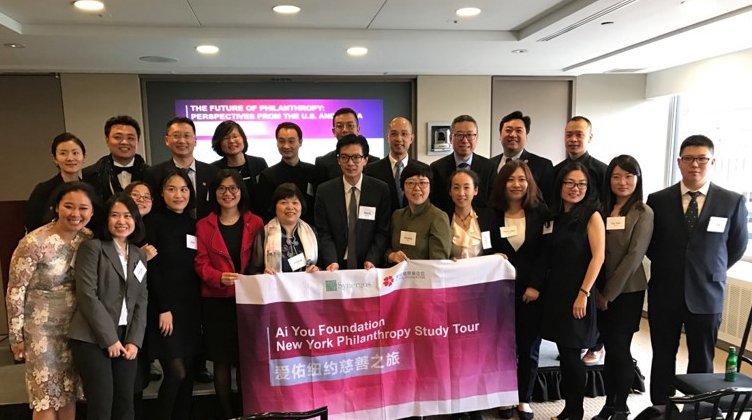

SINA Weibo

SINA Weibo
2017-05-09

In this trip, Ai You and Synergos held “Philanthropy+|New York” forum and discussed the future of charity from the perspective of both China and the United States. This forum is a platform for communication and cooperation between Chinese charity organizations and their American counterparts.
On the forum, Wang Bing, Directorof Ai You Foundation, said in his speech that the US history of charity can be divided into three stages, namely conventional, strategic and innovative charity. These three stages are led by the Rockefeller, Bill & Melinda Gates and Chan Zuckerberg Foundation respectively.
Although charity in China has a much shorter history than charity in America, China has gained great progress in charity in recent years. For example, since 2004, Ai You has developed six projects in helping orphans and poor children, covering over 50000 children. Two of Ai You’s medical aid projects are the largest of their kind in the world. We also support clinical research in medical institutions. The first database for congenital heart defects in China is also set up by Ai You. Five years ago, Ai You entered the second stage in which we promote the development of charity in China in a more in-depth way. We have funded 100 promising NGOs in 85 sub-categories. Currently, Ai You has become a platform and we will support more types of charity organizations to build a thriving charity community in China.
Applying new technology in philanthropy enabled charity in China to overtake US charity. An example is that many US organizations are still using mails and E-mails for fundraising while in China, large-scale fundraising can be done very rapidly on mobile phones.
In his answer to the question raised by American colleagues about how to balance risks and innovation, Wang said, “For Ai You, innovation is essential for our development. This is also the message we try to convey to our American colleagues. China’s charity has gained much progress. I am confident that Chinese charity organizations can find better strategies to catch up with our American counterparts. And I hope that you can understand changes happening in China’s charity cause.”
Wang believed that in the next 20 to 30 years, charity organizations in China and America can forge win-win cooperation because we share the dream of social wellbeing and we can share business models and technology.
Stephen Schwartzman, co-founder, Chairman and CEO of the Blackstone Group delivered a keynote speech, talking about his intention in establishing Schwartzman College in Tsinghua University and being the founding director for Schwartzman Scholars program.
Mr. Schwartzman said after the financial crisis, the American economy stagnated while the Chinese economy maintained rapid growth with higher employment rate. This angered some Americans. He thought that resentment might trigger trade frictions or even military conflicts. Therefore, we must stop this from happening or at least try to help. This was the reason why he established the program to nurture talent who understand China and can show what China is really like to the world.
He said that the College is not only a bridge between the two countries but also a cradle for innovative, independent and responsible world leaders.
To conclude, he said that we need to step out of the psychological comfort zone and take bold actions which might bring unexpected gains. If one wants to make improvement and learn more skills, one needs to stay more with people who master this skill. We should be bold enough to take adventure and embrace the future.
Roundtable: Major problems in philanthropy today
In the first roundtable discussion, Jessica Geng, secretary-general of the Ai You Foundation, Zhang Li, secretary-general of the Alashan SEE Foundation, Hilary Pennington, vice president of the Ford Foundation, Rob Rosen, the director for executive office and philanthropic partnerships at the Bill & Melinda Gates Foundation discussed major problems in philanthropy today.
Geng elaborated on her thoughts about application of technology in philanthropy in the future. She said that technology is a double-edged sword. Technological advancement can help solve poverty, food security, energy, environment and public health problems. However, new technologies might also create new social problems. Who should be responsible for curbing these problems? This is a new question we need to answer.
When asked whether charity in China is developing too fast, Geng said, ”I think charity in China is not developing fast enough to respond to new challenges in society. We need to discover problems as early as possible and leverage all kinds of resources to deal with emerging ones. We should stay alert and visionary to identify problems looming large and give early warnings.”
Hilary Pennington pointed out that governments, charity organizations and businesses should explore how we can use software and hardware available to know what people really need and to match donors and people receiving help. These are problems that we need to tackle.
Zhang Li introduced the history of the Alashan SEE Foundation and explained his understanding of legal governance of NGOs in other countries and his worries over insufficient funding for environment protection. He said, the SEE Foundation would continue to promote the input of resources from the private sector and call for public participation. He believed social groups play a very important part in protecting the environment.
Rob Rosen said in a globalized world economy connected by Internet, the problems we face together are understanding status quo, building connections to solve social problems and living up to our full potential.
Roundtable: philanthropic innovation
The theme of the second roundtable was philanthropic innovation. The panelists were Li Jing, vice secretary-general of the Tencent Foundation, Yang Guang, chief editor of the Sina Weibo Charity, Lukas Haynes, the executive director of the David Rockefeller Fund, Liesel Pritzker Simmons, co-founder of the Blue Heaven Initiative and ImPact.
Lukas Haynes talked about the importance of inheritance to the Rockefeller Foundation and how to use the inheritance in philanthropy. He said that they were making innovations to find better ways to use the money. When asked by the host about what is the priority of charity now, he said we should strengthen global cooperation in this regard.
Li Liang talked about Tencent’s innovation in her answer to a question by the host about how to encourage more people to participate in charity. She said Tencent launched an activity called “Charity Day” held annually from 7th to 9th September which attracted more than 10 million Tencent users to participate and donation exceeded 300 million yuan. Besides, Tencent Charity also developed some new products to allow users to donate by using their number of steps recorded by Wechat sports, reading time and distance of riding shared bikes. Tencent embedded charity in some of their products to encourage their users to do charity and live a healthy life.
Liesel Pritzker Simmons introduced impact investment. When asked by the host about whether impact investment is the solution to problems in charity, she said that although business innovation solved many problems, we still need civil society and government’s contribution.
Yang Guang introduced charity innovation in China. When talking about the role technology plays in future charity, he said, ”We focus more on technology’s role in changing the ideas of the public and people receiving help. In China, we are lowering charity cost and improving efficiency of charity work by using technology. On one hand, we hope to use Internet technology in charity in a people-oriented fashion. For example, we launched the Ant Forest initiative with Ant Financial Services and the Alashan SEE Foundation. Users can help tree planting effort on grassland by using our app. On the other hand, we hope to help small and medium-sized charity organizations to improve social wellbeing and hope to change the general public’s idea about charity. This is what Sina Charity is doing.”
The last speaker was Peggy Dulany Rockefeller, the fourth-generation member of the Rockefeller family, chair of the Synergos Institute. She said:”I always believe that we need to devote ourselves heart and soul to charity. We need to listen to all parties to find the right direction and strategy. We need to build mutual trust to work with different sectors of society and colleagues from other countries. We usually say innovation is what defines the future but we should never forget the conventional wisdom. China has much to offer in this regard since it has a longer history than the U.S.”